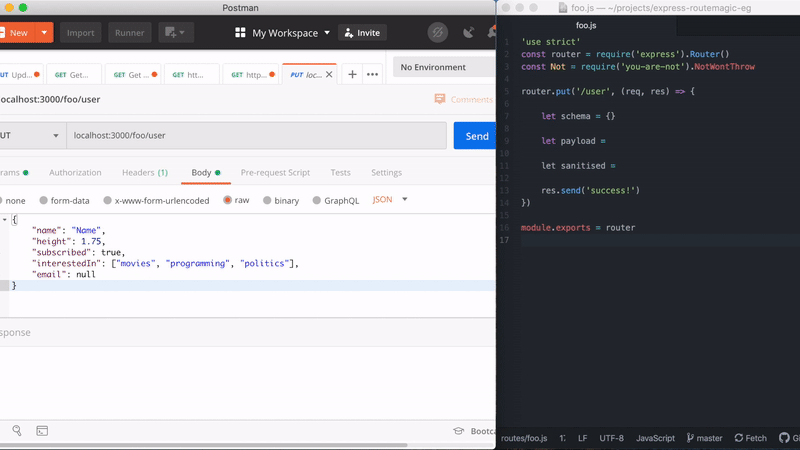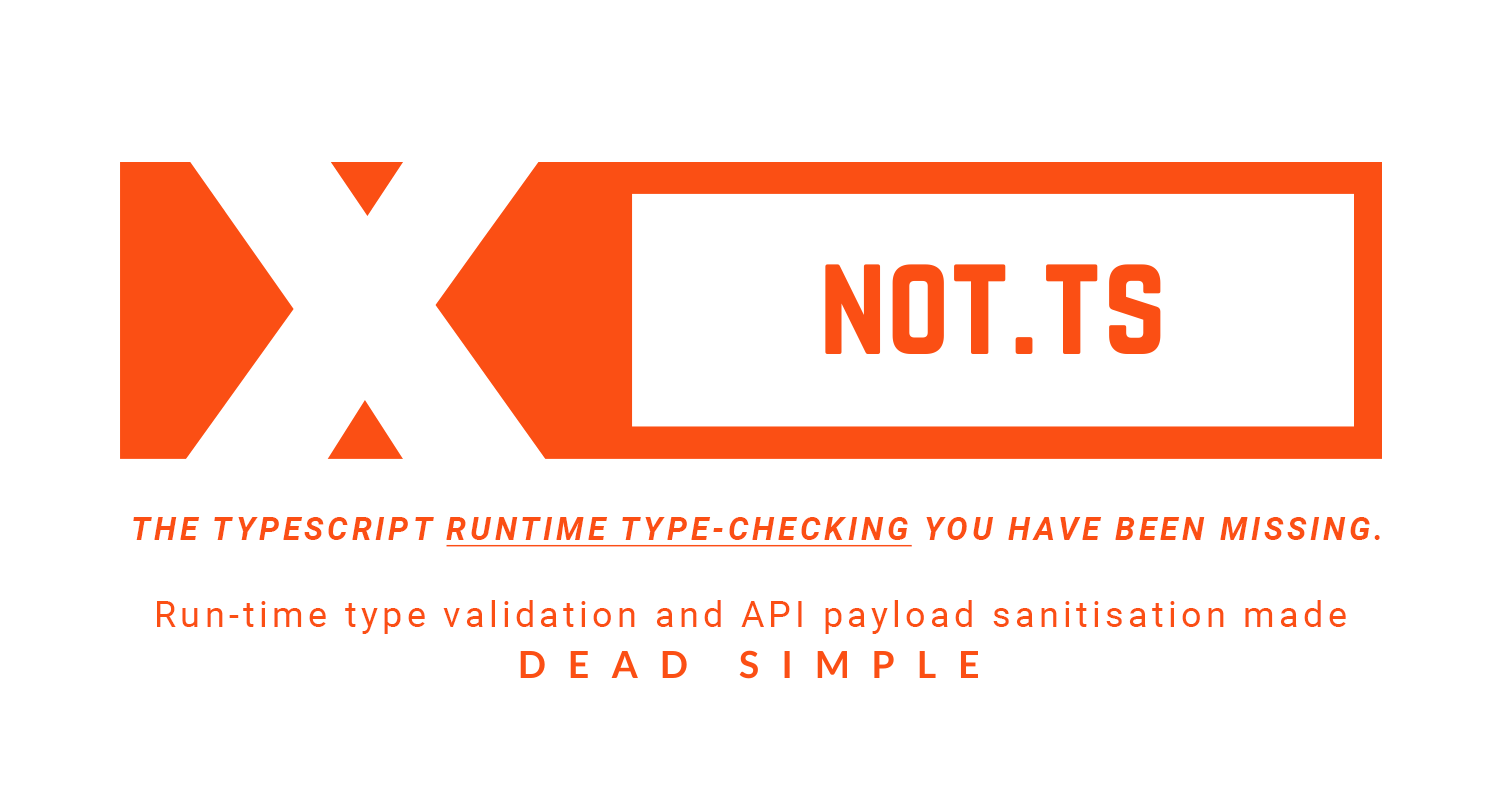you-are-not
v1.0.12
Published
Runtime type-checking written in TypeScript -- Not is a minimal, blazing fast, intuitive, API-centric, and customisable API payload sanitiser/type-checking/validation/error handing and messaging helper -- all in a small and neat pack.
Downloads
134
Maintainers
Readme
Not is the minimal and blazingly fast "implement-and-forget" runtime type-checking library written in TypeScript for instant API payload checking and sanitisation, with ready-to-use error response messages to your API requestors -- all in a small and neat pack.
import Not from 'you-are-not' // ES import syntax
const Not = require('you-are-not') // CJS require syntax
let schema = { id: "number" } // endpoint only expects param "id"
let malicious = { id: 1, role: "admin" } //payload with malicious "role: admin"
let sanitised = Not.scrub(
"objectName",
schema
payload
)
console.log(sanitised)
// outputs:
// { id: 1 }role: "admin" is removed. Payload sanitised.
Why Not?
Not gives actionable error messages, so you know exactly what has gone wrong with your inputs/arguments/API. Use the messages directly as API replies. Build friendly APIs. Meet project deadlines.

This module has no dependencies.
Installation
npm install --save you-are-notimport Not from 'you-are-not'Simple Usage
1. For API input type-checking, validation, sanitisation and error messaging:
User makes a request with the following payload:
const payload = {
id: 1,
name: 2 // error made by requestor
}API receiving payload defines a schema, followed by scrubbing the payload:
const schema = {
id: 'number',
name: 'string' // note that name is expected to be in `string`
}
let sanitised = Not.scrub(
'payloadWithTypeError', // give your payload a name
schema,
payload,
{ exact: true } // use exact: true if you need the payload to match the schema 100%, else, additional properties will be removed without throwing errors.
)Not throws an actionable error message ready for sending back to the requestor:
TypeError (NotTS): Wrong types provided. See `trace`.
... stack trace ...
{
statusCode: 400,
trace: [
'Wrong Type (payloadWithTypeError.id): Expecting type `number` but got `string` with value of `1`.'
]
}If you are using express or fastify, thrown errors can be seamlessly used for production:
//express
res.status(sanitised.statusCode)
res.send({
message: `You have provided erroneous inputs. \n\nMore info:\n${sanitised.trace.join('\n')}`
})
//fastify
reply.code(sanitised.statusCode)
reply.send({
message: `You have provided erroneous inputs. \n\nMore info:\n${sanitised.trace.join('\n')}`
})This will produce a 400 error with the following message property in response body:
You have provided erroneous inputs.
More info:
Wrong Type (payloadWithTypeError.id): Expecting type `number` but got `string` with value of `1`.Suppose additional properties are provided in possibly malicious payloads, they can be sanitised:
let payloadWithMaliciousPayload = {
id: 1,
name: "foo",
role: "admin" // simulating malicious payload. this will be sanitised
}
var sanitised = Not.scrub(
'payloadWithMaliciousPayload',
schema,
payloadWithTypeError
)
console.log(sanitised)
// outputs:
// {
// id: 1,
// name: "foo"
// }role: "admin" is removed. Payload sanitised.
2. Lightweight type-checking
Besides being a payload sanitiser, Not is a type-checker under-the-hood.
import NotProto from 'you-are-not'
const Not = Not.create() // this creates another instance of Not
const not = Not.createNot() // this exposes a simplified #not with no overloads
const is = Not.createIs()
const notNerfed = Not.create({ throw: false }) // creates an instance that will not throw errors.Use Not to cut down runtime type-checking verbiage. Instead of:
if (typeof foo !== 'string' ||
typeof foo !== 'number' ||
(typeof foo === 'number' && !isNaN(foo)) ||
!Array.isArray(foo)
) { throw Error("Not valid, but I don't know why.") }You write:
not(['string', 'number', 'array'], foo)
// or
is(['string', 'number', 'array'], foo)
// code will reach here if the above don't error
startMyFunction()When Not fails, it throws an error by default. You can pass throw: false to prevent throwing errors and handle them yourself:
const not = Not.createNot({ throw: false })
// instead of throwing, `not` will return string
let input = ['a', 'sentence']
let result = not('string', input) // returns a string, which can evaluate `true`
if (result) input = input.join(' ')
// so you can do your own error handling, or transformation
// code below can safely use `input` as string :)
input.toLowerCase()Full Usage
1. Valid types
The valid types you can check for are:
Primitives:
'string'
'number'
'array'
'object'
'function'
'boolean'
'null'
'undefined'
'symbol'
'nan' // this is an opinion. NaN should not be of type number in the literal sense.
Aggregated:
'optional' // which means 'null' and 'undefined'
Other custom types:
'integer'2. #scrub/#checkObject
#checkObject is #scrub under the hood. Use #scrub for simplified usage (example above), and #checkObject when you want more control.
Not.scrub(objectName, schema, payload, options)
Not.checkObject(objectName, schema, payload, callback/options)objectName: (string) Name of object.
schema: (object) An object depicting your schema.
payload: (object) The payload to check for.
options (#scrub): (object | optional). Define exact: true if you want to throw an error if there are additional properties.
callback/options (#checkObject): (object | optional). See example below:
// callback
Not.checkObject(objectName, schema, payload, (errors, payload) => { /* handle errors yourself*/ })
// options
Not.checkObject(objectName, schema, payload, {
callback: (errors, payload) => { /* handle errors yourself*/ },
returnPayload: true/false, // define if you need the payload returned. if not requires, switch to false for better performance
exact: true/false // if true, will throw errors if there are additiona properties
})Defining Schema
// you can use optional notations like this:
"info?": {
gender: 'string',
"age?": 'number'
}
//is same as
info__optional: {
gender: 'string',
age__optional: 'number'
}
//is same as
info__optional: {
gender: 'string',
age: ['number', 'optional']
}Check for multiple type by passing an array:
info: {
age: ['number', 'string'], // age can be of type number or string
email: ['email'] // suppose you have created your own email validation checking. To create your own types, check examples below.
}#checkObject advanced usage
- If
callback/optionsis acallbackfunction, it will run thecallback:
Not.checkObject(name, schema, payload, function(errors) {
// do something with errors.
})(Note: When callback is provided, Not assumes you want to handle things yourself, and will not throw errors regardless of the throw flag.)
- If
callback/optionsis{ returnPayload: true },#checkObjectreturns (a) the sanitised payload (object) when check passes, or (b) an array of errors if check fails:
let sanitised = Not.checkObject(
name,
schema,
payload,
{ returnPayload: true }
)
if (Array.isArray(sanitised) {
// do something with the errors
return
}
// or continue using the sanitised payload.
DB.find(sanitised)- If
callback/optionsis{ callback: function() {}, returnPayload: true }:
let callback = function(errors, payload) {
if(errors.length > 0) {
// do something with the errors
return
}
DB.find(payload)
}
Not.checkObject(
name,
schema,
payload,
{
returnPayload: true,
callback: callback
}
)3. Not as simple type checker
You can also check for multiple types by passing an array. This is useful when you want your API to accept both string and number:
let not = Not.create()
let id = "123"
let anotherId = 123
let emailOptional = undefined
not(['string', 'number'], id)
not(['string', 'number'], anotherId)
not(['optional', 'string'], emailOptional)
// code reaches this point when all checks passed
4. Methods Available
The Not prototype has the following methods available:
Not.scrub(objectName, schema, payload)
Not.checkObject(objectName, schema, payload, options)
Not.not(expect, got, name, note)
Not.is(expect, got, name, note)
Not.lodge(expect, got, name, note)
Not.resolve([callback]) // this is used with #lodge.
Not.defineType(options)5. Methods: #not and #is
Not.not(expect, got, name, note)
Not.is(expect, got, name, note)expect: (string or array of strings) The types to check for (see below on "3. Types to check for".)
got: (any) This is the the subject/candidate/payload you are checking.
name: (string | optional) You can define a name of the subject/candidate/payload, which will be included in the error message.
note: (string | optional) Any additional notes you wish to add to the error message.
Returns:
- If passed:
false. - If failed: throws
TypeError(default),string(ifwillNotThrow: false) orPOJO/JSON(ifmessageInPOJO: true).
6. Methods: #defineType: Define your own checks
Simple example
Not has a built-in custom type called integer, and suppose if you were to define it yourself, it will look like this:
Not.defineType({
primitive: 'number', // you must define your primitives
type: 'integer', // name your test
pass: function(candidate) {
return candidate.toFixed(0) === candidate.toString()
// or ES6:
// return Number.isInteger(candidate)
}
})
let schema = { age: 'integer' }
Not.scrub('name', schema, {
age: 22.4 // this will fail
})
Not.not('integer', 4.4) // gives error message
Not.is('integer', 4.4) // returns false
Advanced example
Having trouble with empty [] or {} that sometimes is false or null or undefined?
Define a "falsey" type like this:
let is = Not.createIs({ throw: false })
Not.defineType({
primitive: ['null', 'undefined', 'boolean', 'object', 'nan', 'array' ],
type: 'falsey',
pass: function(candidate) {
if (is('object', candidate)) return Object.keys(candidate).length === 0
if (is('array', candidate)) return candidate.length === 0
if (is('boolean', candidate)) return candidate === false
// its the other primitives null, undefined and nan
// which is to be passed as falsey straight away without checking
return true
}
})
Not.not('falsey', {}) // returns false
Not.not('falsey', [null]) // returns error message
Not.is('falsey', []) // returns true
Not.is('falsey', undefined) // returns true
Not.is(['falsey', 'function'], function() {}) // returns true7. Methods: #lodge and #resolve
You can also use #lodge and #resolve to bulk checking with more control:
// create a descendant
let apiNot = Object.create(Not)
// or
let apiNot = Not.create()
apiNot.lodge('string', request.name, 'name')
apiNot.lodge('boolean', request.subscribe, 'subscribe')
apiNot.lodge(['string', 'array'], request.friends, 'friends')
apiNot.lodge(['number', 'string'], request.age, 'age')
// and many more lines
apiNot.resolve()
/* OR */
apiNot.resolve(errors => {
// optional callback, custom handling
throw errors
})(Note: This will not return any payload, since you intended to micro-manage.)
8. Verbose Output
verbose: true
let not = Not.create({
verbose: true,
throw: false
})
not('array', { wrong: "stuff" }, 'payload', 'I screwed up.')
//outputs:
{
message: 'Wrong Type (payload): Expect type `array` but got `object`: { wrong: "stuff" }. I screwed up.',
expect: 'array',
got: { wrong: "stuff" },
gotType: 'object',
name: 'payload',
note: 'I screwed up.',
timestamp: 167384950
}Info: Not's Type-Checking Logic ("Opinions")
Native Javscript typing has a few quirks:
typeof [] // object
typeof null // object
typeof NaN // numberThose are technically not wrong (or debatable), but often gets in the way.
By default, Not will apply the following treatment:
NaNis not a 'number', and will be 'nan'.Arrayand[]are of 'array' type, and not 'object'.nullis 'null' and not an 'object'.
Switch Off Not's Opinions:
You can switch off opinionated type-checking:
let not = Not.createNot({ isOpinionated: false })When false, all of the Javascript quirks will be restored, on top of Not's opinions: An Array will both be an 'array' as well as 'object', and null will both be 'null' and 'object':
not('object', []) // returns false -- `[]` is an object
not('array', []) // returns false -- `[]` is an array
not('object', null) // returns false -- `null` is an objectSwitch Off Opinions Partially:
// both #createIs and #create can take in the same options
let NotWithPartialOpinions = Not.createIs({
opinionatedOnNaN: false,
opinionatedOnArray: false,
opinionatedOnNull: false
})
// or mutate the object before instantiating.
let NotWithPartialOpinions = Object.create(Not)
Object.assign(NotWithPartialOptions, {
opinionatedOnNaN: false,
opinionatedOnArray: false,
opinionatedOnNull: false
})
let not = NotWithPartialOpinions.create()
let is = NotWithPartialOpinions.createIs()More Advanced Usage
Customise your message, by replacing the #msg method
You have to mutate the prototype:
import Not from 'you-are-not'
const CustomNot = Not.create()
//overwrite the msg function with your own
CustomNot.msg = function(expect, got, gotType, name, note) {
let msg = 'Hey there! We are sorry that something broke, please try again!'
let hint = ` [Hint: (${name}) expect ${expect} got ${gotType} at ${note}.]`
// return different messages depending on environment
return global.isDeveloperMode ? msg += hint : msg
}let customNot = CustomNot.create()
global.isDeveloperMode = true
let sanitised = customNot.scrub('someWrongInput', {
someValue: 'string' // schema
}, {
someValue: []
})
// or if using just the type checker:
customNot('string', [], 'someWrongInput', 'file.js - xxx function')Will give error:
Hey there! We are sorry that something broke, please try again! [Hint: (someWrongInput) expect string got array at file.js - xx function. ]License
Not is MIT licensed.



